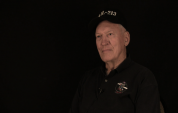6:17 | Air Force veteran Al Matheson recalls how, at the lowest point of his life, following a fierce battle and the discovery of an atrocity, a sunrise turned everything around.
Keywords : Al Matheson Vietnam candy village karst A-1 strafe Minigun Mekong River impale atrocity sunrise Japan flag

Already a capable engineer and a pilot, Al Matheson moved into classified work when he joined the Air Force and was soon flying huge circles in planes full of electronics. This sophisticated operation led to a grand scheme known in the Kennedy administration as the McNamara Wall.
The secret electronic intelligence operation known as Igloo White kept Al Matheson busy flying over Laos and North Vietnam. He describes the complex and exotic technology used which involved IBM mainframes and thousands of sensors, and he analyzes it's predictable failure.
Al Matheson describes how a Beechcraft Bonanza became a drone crammed with electronics that replaced a manned aircraft with a crew of 31. Naturally, the Air Force came looking for that newly idled manpower.
A group of airmen from inside the secret air intelligence effort became Forward Air Controllers with a mandate to report back on what was going on in the non-classified world. Their back channel contacts caused others to wonder how they were so lucky. Al Matheson remembers this as the most rewarding assignment of his career.
Al Matheson had been a pilot on interesting intelligence missions and challenging Forward Air Control missions, but when he had to pick his next assignment, he chose the big birds of the Airlift Wing. He remembers one fateful mission flying orphans out of Vietnam.
Al Matheson highlights his long and varied post-Vietnam career including a strange turn of events which led to him writing out a personal check for a new space shuttle. He considers his experience as a Forward Air Controller, though, to be the high point of his service.